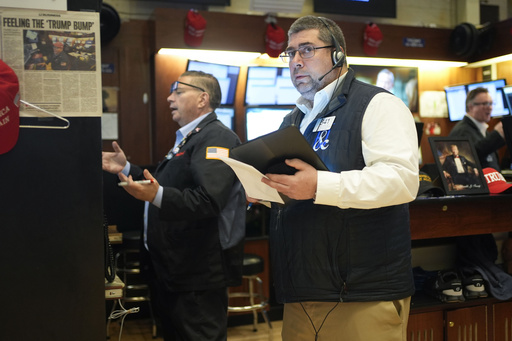
NEW YORK — Wall Street is experiencing a return to stability on Tuesday, with technology shares spearheading gains in U.S. stock indexes, buoyed by a positive earnings report from Palantir Technologies, which has been thriving amid the surge of artificial intelligence.
As of 10:55 a.m. Eastern time, the S&P 500 has risen by 0.6%, recovering from significant fluctuations the previous day spurred by anxieties over President Donald Trump’s tariffs sparking a potentially damaging trade war that could affect economies worldwide, including that of the United States.
The Dow Jones Industrial Average saw an increase of 25 points, approximately 0.1%, while the Nasdaq composite surged by 1.2%.
On Monday, Trump announced a postponement of tariffs on imports from Canada and Mexico for one month, a decision that was revealed after trading concluded for the day. This announcement has renewed hopes on Wall Street that Trump’s aggressive stance on tariffs is predominantly rhetorical. Investors are optimistic that Trump views tariffs as a bargaining chip in negotiations with other countries rather than a steadfast long-term strategy.
This optimism is founded on the belief that Trump, who has previously pointed to the stock market as an indicator of his approval ratings, might be deterred by the potential adverse effects of a significant trade war on Wall Street.
However, the prospect of a trade war remains real, and analysts caution that volatility could persist because Trump’s threats should be considered with both seriousness and precision.
“Investors seem to believe that the stock market acts as a barometer for the administration’s performance, suggesting that any policy modifications harmful to risk assets would be quickly reversed,” stated strategists at Bank of America, led by Mark Cabana, in a report from their Global Research division. “We urge caution.”
They emphasize that a crucial lesson from the tumult surrounding tariffs is that the current administration operates in a transactional manner, with nothing finalized until it is completely resolved.
Trump is moving forward with a 10% tariff on American companies importing goods from China, which led to China retaliating by imposing its own tariffs on some U.S. imports and initiating an antitrust investigation into Google.
The implementation of the 15% tariff on U.S. coal and liquefied natural gas and a 10% tariff on crude oil, agricultural machinery, and large-engine vehicles from the U.S. is set for the following Monday, allowing more time for Trump and Chinese President Xi Jinping to negotiate.
Many analysts on Wall Street differentiate between the tariffs on China and those on other trading partners, suggesting that Trump might retain the tariffs on China for the longer term in order to further distance the United States from its geopolitical competitor.
In contrast, for U.S. allies such as Canada, Mexico, and the European Union, the outcome is likely to be more concessions rather than additional tariffs, according to strategist Thierry Wizman at Macquarie.
Alphabet, Google’s parent company, saw its stock rise by 2.1%.
Additionally, shares that had experienced sharp declines due to tariff concerns on Mexico and Canada displayed increased stability. For instance, automakers had previously experienced tumbles due to significant production in Mexico; however, shares of General Motors rose by 0.7%, and Ford Motor gained 2%.
Investor attention primarily turned towards the earnings reports of U.S. companies, which would typically capture the market’s interest in the absence of trade war fears.
Palantir Technologies’s stock soared by 26.4%, becoming one of the strongest contributors to the S&P 500 after reporting quarterly profits that surpassed analysts’ expectations, while also providing revenue forecasts that were above what analysts had anticipated. CEO Alexander Karp emphasized that his company is at the “center of the AI revolution.”
Conversely, pharmaceutical giant Merck’s shares plunged by 10.5% despite exceeding sales and profit forecasts for its latest quarter, as its revenue outlook disappointed investors due to a temporary halt in the shipment of one of its top-selling products to China.
In the bond market, Treasury yields slightly declined following a report indicating a potential easing in inflationary pressures from the U.S. job market. Job openings reported were fewer than economists had predicted for the end of December, signaling a slowdown, yet still reflecting a healthy job market.
The yield on the 10-year Treasury fell to 4.54% from 4.56% the previous day, while the two-year yield, which aligns more closely with the Federal Reserve’s short-term interest rate expectations, dipped to 4.22% from 4.25%.
In international markets, London’s FTSE 100 experienced a minor slip of 0.3%, whereas other major European markets posted modest gains.
In Asia, Hong Kong’s Hang Seng Index soared by 2.8%, and South Korea’s Kospi increased by 1.1%.

